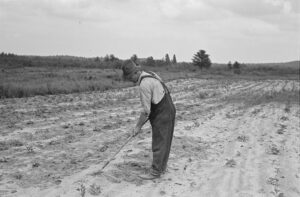
September 28, 2016; Capital Press
Succession—it’s a word that’s used in business, nonprofit organizations, and even family farming. And with 64 percent of Oregon’s farmland changing hands over the next 20 years, nonprofits are among those trying to manage the transition.
According to a joint report by Oregon State University and Portland State University, approximately 10.5 million acres are up for grabs.. Essentially, farmers are aging out and the fate of their properties is uncertain. Rogue Farm Corps, a nonprofit in Oregon that offers farm training programs with hands-on experience, is determined to ensure as many of these farms as possible continue as family farms.
Like most things, this is easier said than done. Rogue Farm Corps’ director of farm preservation programs, Nellie McAdams, explained that bigger farms with fewer owners are a very likely outcome when ownership turnover happens. According to McAdams, this can result in less diverse crop and farming methods. Additionally, larger parcels cost more and can be a hurdle for beginner farmers. Her organization helps those who have little experience to become farmers.
Sign up for our free newsletters
Subscribe to NPQ's newsletters to have our top stories delivered directly to your inbox.
By signing up, you agree to our privacy policy and terms of use, and to receive messages from NPQ and our partners.
The decades-long decline of small family farms coupled with an increase in the farm size, specialization and capitalization began in the 1950s. “The Future of Oregon’s Agricultural Land” updates this trend in Oregon. From 2010 through 2015, almost 40 percent of farmland sales in several Oregon counties were to business entities. Nearly 15 percent of farm sales in those counties involved out-of-state buyers.
Aging baby boomers are a huge segment of the current population, resulting in the massive, projected transfer of farmland in the near future. The report states the average age of Oregon farmers and ranchers is now 60, up from 55 in 2002.
Land changing hands isn’t news, but the report focuses on how it’s going to change hands, as it will affect generations of people and, quite literally, Oregon’s landscape for years to come. According to the study, nearly 100,000 acres of Oregon farmland have already been removed from agricultural production in the last 40 years.
“Traditional” farms aren’t the only pieces of land that are looking for successors. The Land Institute, which recently celebrated 40 years, reiterated its call to action for farming in a sustainable model—but farming nonetheless, instead of business entities focused on investment, finance, or property management.—Angie Wierzbicki













